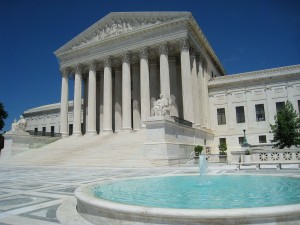Experienced Federal Crime Attorney: Specialist Protection in Federal Crime Situations
Experienced Federal Crime Attorney: Specialist Protection in Federal Crime Situations
Blog Article
Demystifying the Process of Federal Appeals: What You Need to Know
Browsing the detailed realm of government charms can commonly look like passing through uncharted waters for those strange with the procedure. Understanding the nuances of appellate court territory, the intricacies of submitting a notification of charm, providing a compelling brief, and making an influential oral disagreement are vital elements that can considerably influence the result of a case. By untangling the layers of complexity bordering federal charms, individuals can acquire a more clear insight into the mechanisms that regulate this critical point of the legal system.
Recognizing Federal Appeals Refine
Delving into the elaborate world of the federal appeals procedure introduces a methodical and structured trip via the judicial system. Federal allures function as a vital system for examining choices made by lower courts. Recognizing this process is essential for anyone associated with lawful process at the government level.
The procedure typically begins with an event disappointed with a reduced court's ruling filing a notification of allure. This sets off an evaluation by a greater court, where a panel of judges analyzes the lawful arguments provided by both events. Briefs describing the legal reasoning behind each event's setting are sent, and oral debates might be heard to make clear complex issues.
The appellate court's choice is based on an extensive exam of the lower court's procedures and the debates presented. Once the appellate court reaches a choice, it can verify, turn around, remand, or customize the reduced court's judgment, supplying quality and finality to the legal disagreement.
Appellate Court Jurisdiction Discussed
As we advance from understanding the government charms process to studying the details of appellate court jurisdiction, an essential facet emerges regarding the authority and restrictions of these higher courts in the legal landscape. Appellate court jurisdiction describes the range of instances that a particular appellate court has the power to assess and choose upon. Unlike high court that hear situations for the very first time, appellate courts are restricted to assessing choices made by reduced courts. These choices can include judgments from both state and federal courts.
Appellate courts have territory over details kinds of instances, generally those involving lawful mistakes, step-by-step concerns, or questions of regulation as opposed to factual conflicts. The jurisdiction of appellate courts is usually described in statutes and legislations that control the court system. Recognizing appellate court jurisdiction is critical for celebrations involved in the allures procedure as it determines whether an instance is eligible for evaluation and the level to which the appellate court can intervene in the reduced court's decision.
Declaring a Notice of Charm
The preliminary action in beginning the federal appeals process entails filing a Notice of Charm with the appropriate appellate court. This essential record officially notifies the court and the other parties associated with the case that the appealing party means to look for a review of the lower court's decision. Filing a Notification of Allure is a rigorous procedural need that sets the appellate process moving.
When preparing the Notification of Allure, it is crucial to make sure compliance with the certain guidelines and guidelines of the relevant appellate court. federal appeal lawyers. The document has to usually include information such as the case name, the lower court's name, the day of the judgment being appealed, and a succinct declaration suggesting the grounds for the allure

Briefing and Oral Argument
In the appellate process, offering written briefs and involving in oral debates play critical roles in supporting for the appealing party's setting before the appellate court. Briefs are thorough lawful papers that detail the parties' disagreements, lawful authorities, visit homepage and analysis supporting their placements. These written submissions provide the court with an in-depth understanding of the facts of the case, the appropriate law, and why the appealing celebration believes the lower court's choice need to be rescinded.
Complying with the entry and testimonial of the briefs, oral disagreements provide the events a possibility to further clarify their settings, address any type of inquiries the appellate courts might have, and highlight key points from their composed briefs. Dental debates are an opportunity for the lawyers to encourage the judges with spoken advocacy and feedbacks to queries from the bench.
Both the composed briefs and oral arguments are vital components of the appellate procedure, permitting events to provide their situation thoroughly and compellingly prior to the appellate court. - federal crime attorney
Obtaining the Appellate Court Choice
The appellate court's choice is typically supplied in a created style and outlines the court's final thoughts on the lawful problems offered, the reasoning behind their choice, and the judgment provided. The time frame for obtaining the appellate court's decision can vary, yet courts strive to supply timely resolutions. Whether the appellate court attests, reverses, or remands the lower court's choice, recognizing the implications of the judgment is crucial for all celebrations entailed in the appellate procedure.
Conclusion
In verdict, the government appeals process is a complicated yet essential action in seeking justice. Comprehending the appellate court territory, submitting a notification of appeal, preparing briefs, and presenting oral disagreements are all essential components of this process. Eventually, getting the appellate court choice can give quality and resolution to legal disputes. It is very important to navigate the federal charms process with persistance and interest to information to attain a reasonable end result.
As we advance from understanding the federal appeals procedure to studying the details of appellate court territory, a basic element comes to light relating to the authority and limitations of these higher courts in the lawful landscape. Appellate court jurisdiction refers to the scope of cases that a specific appellate court has the power to make a decision and examine upon. Unlike trial courts that hear instances for the initial time, appellate courts are restricted to evaluating decisions made by reduced courts. Recognizing appellate court jurisdiction is vital for parties entailed in the allures process as it determines whether an instance is qualified for evaluation and the extent to which the appellate court can interfere in the lower court's choice.

Report this page